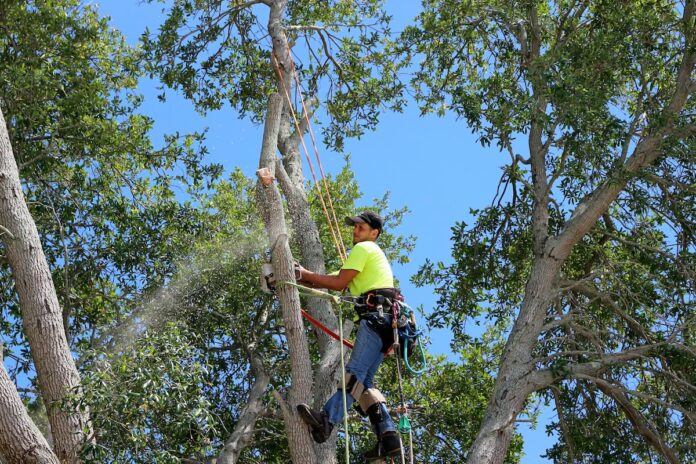
(Georgia Recorder) — When there are trees in your yard that need to come down, even die-hard DIYers are likely to call an expert, and for good reason.
“If you really stop and think about our industry, every single thing we do can kill you,” said Rusty Lee, a certified arborist and horticulturist with Norcross-based Heirloom Tree and Garden, at a fall hearing of the state House committee tasked with increasing safety in the industry.
”The chipper can kill you – not only kill you, destroy you – where only DNA is going to figure out who you are,” he added. “The chipper will kill you, falling out of a tree can kill you, the tree falling on you can kill you, parts of the tree falling can kill you, electricity can kill you. So, everything we touch – the chainsaws will kill you – everything is dangerous. And right now, if you have a pickup truck and a chainsaw and a case of beer, you’re in the tree business.”
According to the committee, tree care providers in Georgia have no specific licensing or registration requirements and there are no standards or regulations concerning the training of tree care providers, the use of equipment or insurance requirements.
A 2020 report from the U.S. Occupational Safety and Health Administration found that the fatality rate for tree trimmers and pruners may be as high as 1 in 1,000, nearly 30 times higher than the national average fatality rate of 3.5 per 100,000 for all workers. And as of 2017, Georgia had the third highest rate of reported incidents in the tree care industry, with only California and Florida reporting more incidents, according to data from the Tree Care Industry Association.
Tierson Boutte, founder of Atlanta-based Boutte Tree Service and president of Georgians for a Safer Tree Industry, or GFASTI, told committee members that he thinks the situation won’t improve without government intervention.
“When I got into the industry, it was a small industry,” he said. “There was probably more people working in logging than there were in tree care, but it’s changed. Because there’s more suburbanization, and then the logging is mechanized now, so there’s just all these people, more and more people, and there’s more and more demand, and that’s a growing industry and everything like that, so we need your help to help us solve this problem.”
According to its website, GFASTI supports a law that would require contractors and subcontractors involved in tree care operations to have a license, which would require them to carry insurance and provide basic safety training but not require a credentialing process like a test.
“Nobody wants a tree industry that’s got all kinds of insane barriers to entry or anything like that,” he said. “We think that a little regulation in the right place could save a lot of lives without leading to that point.”
On Friday, the committee approved recommendations that include introducing legislation to create a license and regulatory program for the tree care industry based on a draft proposed by GFASTI. Lawmakers are set to meet in Atlanta next month, when they will have the opportunity to propose specific bills.
“In my opinion, based on the results and the discussions we’ve had in the committee and the presentation that was made, that we do feel that there is a place for state involvement from a regulatory and oversight standpoint with the people who are primarily in this business as a trade and put themselves forward for hire as tree care professionals,” said committee chair Victor Anderson, a Cornelia Republican.
Woodstock Republican Rep. Jordan Ridley, who works in the tree industry, said because of Hurricane Helene, the committee did not hear from people from within the industry not affiliated with GFASTI, and he was wary about regulations creating a slippery slope.
“I just have hesitation when we say we should introduce legislation for a thing when it was one-sided,” he said. “I would love to work forward and bring some of the other voices to make sure if a member does want to bring legislation they can get a well-rounded approach.”
Anderson said lawmakers would consider input from all sides before passing legislation.
Another recommendation was that any licensing and regulatory program go through the Department of Agriculture rather than the Secretary of State’s office, which typically oversees business licensing in Georgia.
Leaders in the House and Senate this year created a joint committee to investigate constituent complaints about delays and inefficiencies with the Secretary of State’s Professional Licensing Boards Division.
“It’s not a secret, but there is extreme scrutiny right now of the other licensing department through the Secretary of State at this moment, and I feel like to have a good chance for something happening, we may want to look at a different avenue,” Anderson said.
“The Department of Agriculture makes the most sense even without that scrutiny going on with the secretary’s office right now,” he added. “So that’s the reason that, again, this is a recommendation. Department of Ag may come back and say we don’t want it. I don’t think they will because they already told me offline that they would accept it.”







